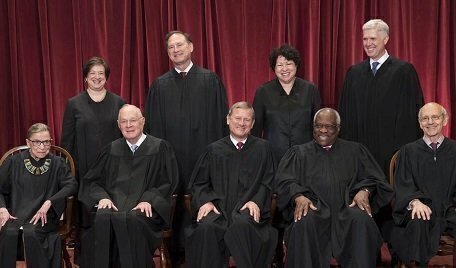The Supreme Court on Monday acted – probably because of procedural reasons – to leave undecided at least for now the spreading controversy over whether federal civil rights laws give protection to workers and students who are gay, lesbian or transgender.
 Without offering any explanation – and, significantly, without any noted dissents – the Justices refused to hear the appeal of a former security guard at a Georgia hospital that she was discriminated against because she is a “gay female.”
Without offering any explanation – and, significantly, without any noted dissents – the Justices refused to hear the appeal of a former security guard at a Georgia hospital that she was discriminated against because she is a “gay female.”
Lawyers for Jameka K. Evans of Savannah tried hard to salvage the case at the Court after lawyers for Georgia Regional Hospital said they would not take any part in it even if the case were accepted for review, but that effort apparently failed when the Justices discussed the case in private for the first time last week. On Monday, a simple order denied review.
The denial of review marked the second time in about a year that the Court stepped aside from the dispute of whether two civil rights laws – known as Title VII and Title IX – now cover discrimination based on sexual orientation or gender identity. (Title VII, enacted in 1964, outlaws bias in the workplace “because of sex” and Title IX, passed in 1972, forbids discrimination “based on sex” in any educational program that receives federal funds.)
The Court had agreed last year to review the controversy as it applies to Title IX in a case involving a transgender high school student in Virginia, but that case was sent back to a lower court after the Trump Administration abandoned the defense of his claim; the Obama Administration had supported that plea. The case is now being reviewed back in a trial court in Norfolk.
The new case of the Georgia hospital worker, based on the scope of Title VII, seemed like a natural one for the Court to take on, since federal appeals courts have now split on that issue, and two federal agencies also take opposite positions on it. The Justice Department in the Trump Administration announced in July its opposition to extending Title VII to sexual orientation cases, and the U.S. Equal Employment Opportunity Commission has supported that interpretation for several years. The EEOC similarly holds that view of Title IX.
Those opposing positions as to Title VII are now being explored by the U.S. Court of Appeals for the Second Circuit, with the full (“en banc”) bench of that court still deliberating on a decision after holding a hearing on September 26. No matter who wins or loses that case, it is likely to move on to the Supreme Court.
In the Title VII case denied review by the Justices on Monday, Ms Evans claimed that she was the target of harassment and was denied a promotion because she regularly wore her hair short, wore a male uniform to work, and otherwise was perceived as gay. She contended that a co-worker who is not gay got a promotion even though less qualified than she was.
There were no apparent procedural complications in the case as it worked its way through lower federal courts, winding up with a 2-to-1 decision last March by the U.S. Court of Appeals for the Eleventh Circuit. It ruled that the 1964 law does not go beyond discrimination between male and female workers. In April, a split developed when the U.S. Court of Appeals for the Seventh Circuit became the first appeals court to rule that Title VII does apply to such bias based on sexual orientation.
Once the Evans case from Georgia had reached the Supreme Court, procedural complications soon began. The hospital’s lawyers said they would not take any part, and argued that the case against it had been procedurally flawed, and that it was not the right entity to have been sued.
It chose not to reply to the Evans appeal, but then the Justices asked for a response.
Again, the hospital’s lawyers raised procedural issues, and again said they would not participate.
Evans’ lawyers argued in reaction that the Court could have appointed another lawyer from outside the case to defend the lower court ruling against Evans, as the Court does with some frequency when one side in an appeal bows out or does not show up. Evans’ team also said that the Court probably would have opposing sides appearing in the case anyway if it would grant rreview, since the Justice Department would probably join in against Evans.
The Justices, however, apparently decided against taking either suggestion, and simply denied review. If the case had appeared to be one in which procedural difficulties could have been overcome, and the Court still voted to deny review, there almost certainly would have been dissenters. None were noted in Monday’s order.
Evans’ lawyers had argued that the Court should take on the controversy, saying that the issue had “profound implications for individual dignity and employment practices from coast to coast.”
Her appeal had the support of 17 states and Washington, D.C., plus a number of gay rights groups and academics specializing in anti-discrimination law.
Legendary journalist Lyle Denniston has written for us as a contributor since June 2011 and has covered the Supreme Court since 1958. His work also appears on lyldenlawnews.com.







